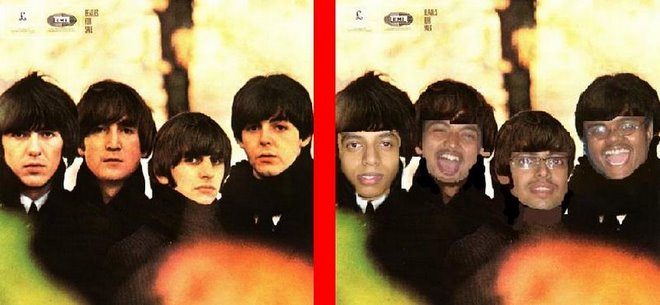Faith inherently is ALWAYS blind.
There can never exist something like "reasoned faith" or "logical faith".
To elaborate, here is a quote from Douglas Adams' "Hitchhiker's Guide to the Galaxy":
"I refuse to prove that I exist," says God, "for proof denies faith, and without faith I am nothing."
Basically what I'm saying is, anyone who believes in God in any form, does so in a faith as blind as that which tells people to sacrifice children in order to appease deities, or add an extra 'k' or 'a' to their names, or consume the remains of human cremations on the banks of a holy river.
Its just that when society finds some forms of faith "outrageously" (again a relative term) malignant or trivial, it brandishes them as 'blind'.
I could even extrapolate this to our faith in more tangible entities, like human beings.
True, past experience does add a sense of comfort et al, but as with any living organization (person/company/mutual fund/etc), "past performance does not guarantee future results."
If we were to REALLY think logically and scientifically, then we should all live a life engulfed in paranoia, with each person unsure of whether to trust even oneself, let alone others. At some level, blind faith does seep into our existence, and serves as a nice cushion for all that the world throws at us.
Sigh...
Feels nice writing again! :)
Cheers duniya!
PS: In case some parts sound a bit fanatic, then I'm glad they do. Its a welcome change from the stiflingly numbing habit of diplomacy.
In case they don't, well, no issues then either! :D
Subscribe to:
Post Comments (Atom)
Copyright

These works by Anand Justin Cherian are licensed under a Creative Commons Attribution-Non-Commercial-Share Alike 2.5 India License.
Cheers to South Park!
Q. - While people will always act within the bounds of human nature -- good people being good and bad people being bad, it takes religion to make good people bad.
A. - "Well, many religions also give people good reasons NOT to do bad things. And while people may do terrible things in the name of religion or via religion, they may have well still done them without the religion there -- it's just a justification provided for a choice already made."
-- Matt Stone & Trey Parker
(From South Park FAQ's)
Bet you didn't expect THIS from the ones who made Cartman and the gang! :)
A. - "Well, many religions also give people good reasons NOT to do bad things. And while people may do terrible things in the name of religion or via religion, they may have well still done them without the religion there -- it's just a justification provided for a choice already made."
-- Matt Stone & Trey Parker
(From South Park FAQ's)
Bet you didn't expect THIS from the ones who made Cartman and the gang! :)
Dilbert
Beatlemania!!!

3 comments:
:)
needless to say, i argue again:
"past performance does not guarantee future results."
well, this is so not true. One learns from mistakes.
anyways, on the issue of faith, here is a quote from Feynamn:
"When a young person loses faith in his religion because he begins to study science and its methodology] it isn't that [through the obtaining of real knowledge that] he knows it all, but he suddenly realizes that he doesn't know it all"
and then you can read it again by ignoring the phrase "in his religion" to generalize the statement.
Can we reduce it to a chicken-egg problem in any way? We always run around circles any way.
it is tru.. that man is born with a brilliant innate ability to adaptively "grow" and improve on himself..
but still,
"past performance does not GUARANTEE future results"
will ALWAYS stand...
and wen we trust on something without a certainty of it occurring, we place a minimum level (if nominal) of (BLIND) faith in him/her...
and yes... id read that line by feynman on ur gtalk profile long back... bilkul, i completely agree.. its in accordance with my belief that:
"one must know a lot in order to know how little one knows.."
the underlying argument of my post was, simply that, there is no such thing as logical faith.. if ur trust in something/someone is based on proven logic, then it is something other than faith...
its a logical, organic building up of trust, based on the foundations of experience and observation, but it cannot be termed faith then...
faith be definition, is only that which doesnt require/demand proof..
Post a Comment